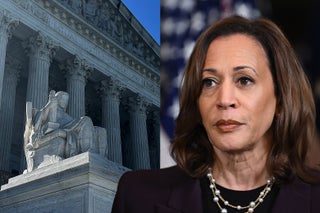

The Supreme Court’s presidential immunity decision is a mistake. The president has called for a constitutional amendment to overturn it. But the most harmful parts of that mistake could be reversed in a process that Vice President Kamala Harris could begin tomorrow. American constitutional law has long struggled with the scope of implied presidential immunity. President Richard Nixon startled David Frost in his post-presidency interview when he asserted that “when the president does it, that means that it is not illegal.” In the narrow context he was describing, Nixon was right —not because of any monarchical power held by the president, but because of limits on the power of Congress to regulate certain acts of the president. If Congress can’t regulate a presidential power, Congress can’t make acts around that power “criminal.” This is the core of presidential immunity: the substantive limits on Congress’ power to regulate the president.
But immunity is not just about substance. It’s also about buffers. The core may be constitutional limits. The practice, however, extends immunity beyond that core so as to give presidents the breathing room they need to do their job effectively. How much breathing room is necessary is not determined by the Constitution. It is a judgment, a balance, chosen by the Supreme Court. The Supreme Court has now extended that buffer in the context of alleged presidential crimes. No doubt, the court affirmed, there is no immunity for unofficial acts, or acts beyond the “outer perimeter of official responsibility.” But when unofficial acts are pursued through official means, and they involve core constitutional powers, then the president may not be held responsible for the exercise of that core presidential authority, and evidence from those official acts may not be demanded when prosecuting the crime.